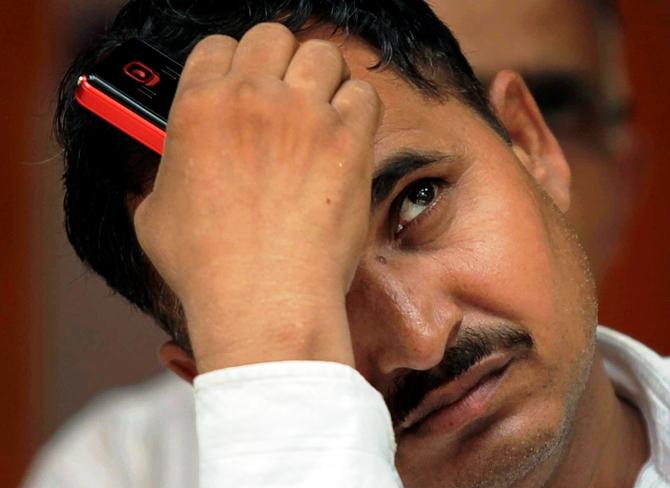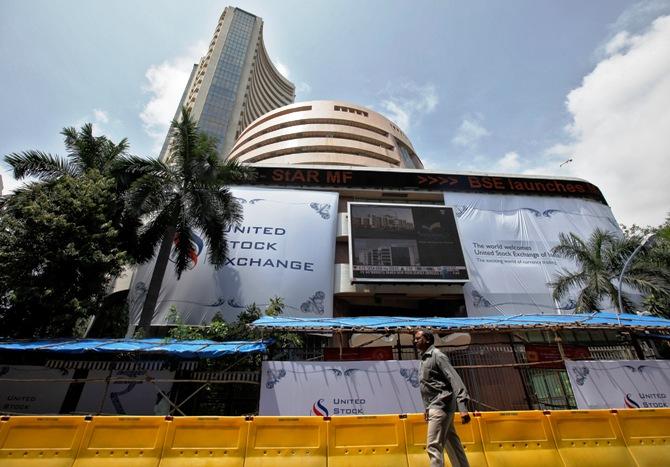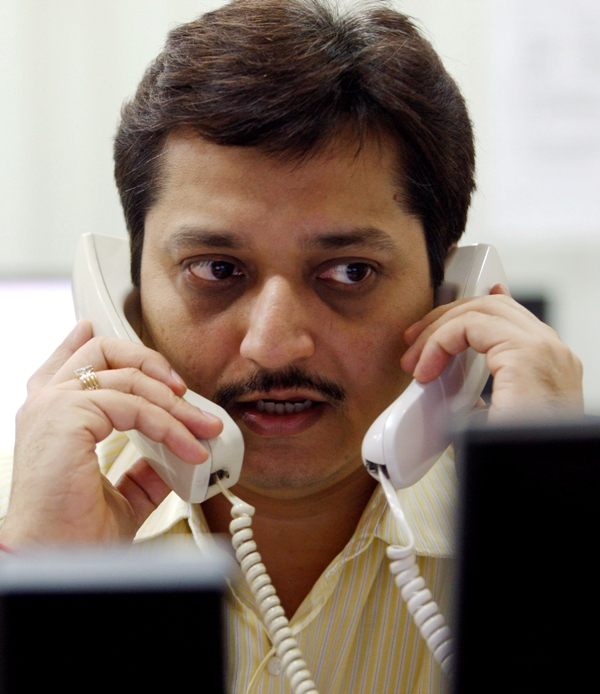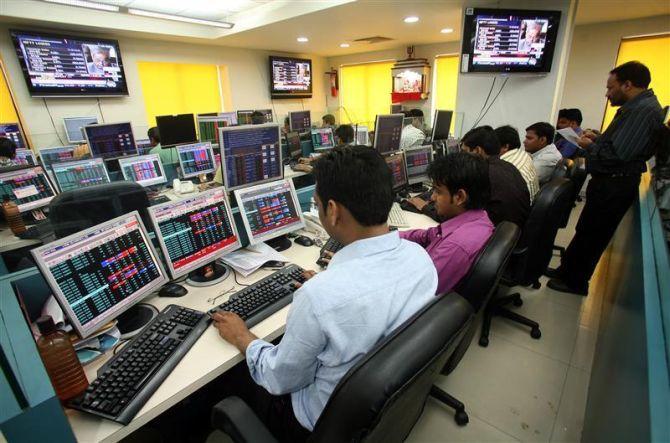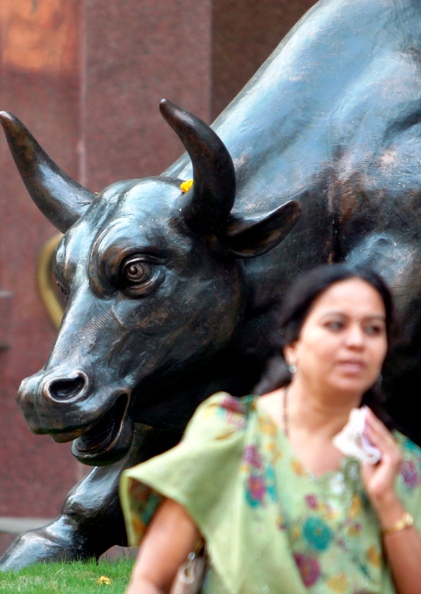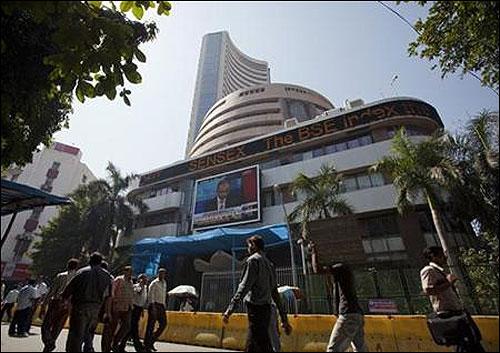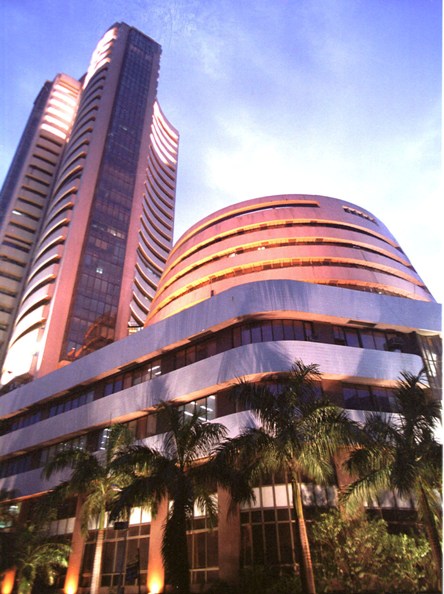 | « Back to article | Print this article |
'In 2014, markets will be as volatile as in 2013'
The second quarter earnings season ended on a happier note than expected, the current account deficit appears to have been tamed for now and the recent elections seemed to show that investors might get their choice of government.
Is this the end of bad news?
Bhavtosh Vajpayee, managing director and head of the Indian equities business at Barclays, the London-headquartered multinational banking and financial services company, tells Business Standard it is still too early to predict recovery.
Click NEXT to read the edited excerpts. . .
'In 2014, markets will be as volatile as in 2013'
The past couple of months have seen many political and macro economic developments. How do you see these impacting the markets?
Market sentiment usually improves well in advance of macro economic data.
The latter serves to keep sentiment grounded.
If you look at India's investment cycle, reduction in corporate debt, cleaning of balance sheets and gross domestic product growth, these variables might take two to three years to revive.
On the other hand, variables such as trade and the current account deficit can be handled deftly in the short term, as we have seen.
Investors positioned at extreme ends of the market have suffered because there have been sharp rallies and changes in sentiment.
We recommend a portfolio that mixes some level of defensives and some aggression. This will be our approach over the next few months.
Click NEXT to read further. . .
'In 2014, markets will be as volatile as in 2013'
India has managed to bring down its CAD in a short span but is this sustainable if the curbs on gold are removed in 2014?
We think it has been effectively managed for this fiscal year by placing significant curbs on gold import.
I disagree when people say India is like any other economy.
There are two ways in which India is different in this context.
First, its appetite for gold is unusual.
Second, the scale of its diaspora abroad is enormous, which has of late pumped billions of dollars into the country.
A smart government can use a mix of a carrot and stick approach to manage the deficit. We think the worst is over.
Click NEXT to read further. . .
'In 2014, markets will be as volatile as in 2013'
How can investors interpret the earnings performance of corporate India in the second quarter? Are downgrades over?
One of the big surprises of the latest quarter was that overall revenues and operating profits got a slight upgrade (for BSE 100 companies).
Nobody expected that, which is why the markets got a booster.
Earnings got downgraded by a few basis points and not by hundreds.
Given the sentiment into the results season, the set of companies we analyse did remarkably well.
Now, if the market starts expecting a revival in fortunes too soon, they will be disappointed.
The asymmetry of earnings growth will continue. Industrials, select materials and infrastructure companies have continued to see downgrades and there might be further downgrades in that space.
On the other hand, the buoyancy in pharmaceuticals and technology continues.
Even financials saw some stability recently.
Click NEXT to read further. . .
'In 2014, markets will be as volatile as in 2013'
When do you see industrials and materials picking up?
The industrials sector feeds off the capital expenditure cycle.
For the capex cycle to revive, past investments that have been locked in incomplete projects need to revive.
No group will make fresh investments as long as they have capital work in progress.
Over the past 15 years, the largest percentage of fixed assets locked in ongoing projects is in the current and previous fiscal years.
Vast amounts of money are locked in assets that are not generating any income, the primary reason for wreckage of corporate balance sheets.
We should not expect a quick fix to this problem.
Click NEXT to read further. . .
'In 2014, markets will be as volatile as in 2013'
Would a change in government help resolve some of these issues?
Economic policies have not varied between key political alignments in the country, provided these alignments are strong.
So, it would be fair to say the key thing that India needs is a strong and effective government.
A lot of speed breakers to the capex cycle need to be removed.
Can a strong government do that?
Maybe, and that's what the markets are hoping.
Is it commonplace to see investors rooting for a particular formation?
I think Indian politics is also evolving, where economic anchors of parties are becoming clearer.
The debate around politics and its impact on economic policies is healthy.
The markets are voting with their feet, as was seen last week.
Japan is another example where the change in leadership was accompanied by monetary easing and that was one of the fundamental anchors of the new political alignment.
Click NEXT to read further. . .
'In 2014, markets will be as volatile as in 2013'
What are foreign institutional investors concerned about at this point?
Funds have been under pressure to change their portfolios, as the flavour of the market has shifted from quality defensives, which are obviously not inexpensive, to a value rally.
This has seen various beaten-down stocks and sectors perform.
What fund managers want to know is how much they should swing with the sentiment.
What kind of a year will 2014 be, other than the political issues out there?
It will be a volatile year.
India will be a very noisy battleground of politics and amid all this, we are at only 4.8 per cent gross domestic product growth.
If you take away the impact of monsoons and agri GDP spike, we could go back to 4.5 per cent growth.
Volatility in the equity markets will be on a similar scale as 2013.
Click NEXT to read further. . .
'In 2014, markets will be as volatile as in 2013'
What is in store for the banking sector?
This quarter was relatively better in terms of accretion of bad debt, compared to previous quarters.
Our preference is for safety.
It is hard to take a call on one quarter's performance.
Given the restructuring of challenged loans in the Indian banking system and also that accounting principles around bad loan recognition are different in India versus other developed markets, it is useful to look at the cash flows of India Inc to assess the credit quality cycle’s health.
We see cash flows of companies improving gradually as fresh capex has come to a halt -- new projects are not being announced.
At the same time, older investment should gradually come to fruition and generate cash flows.
Yet, this will take some time to resolve.
Again, we see a two-year healing process here.
Click NEXT to read further. . .
'In 2014, markets will be as volatile as in 2013'
Do you expect the defensives to continue to perform?
Going forward, we expect staples to do worse than they have in recent times.
We see technology continuing to perform.
So far, the technology trade has been about the weak rupee but we see demand reviving as well.
The pipeline for pharmaceuticals continues to be healthy.
So, among the defensive sectors, we see the earnings trajectory shifting downwards only for staples, not for technology and health care.
Hence, we do not see any reason to abandon the defensives space.
What are the big risks for 2014?
A hung Parliament is the single biggest risk for the markets.
The memory of a new Prime Minister every 12 months is still fresh in people's minds and if that happens, we are in for a prolonged period of slow growth and poor market sentiment.
To the markets, India's general elections are more important than anything else that will happen next year, including the US Fed’s tapering.
